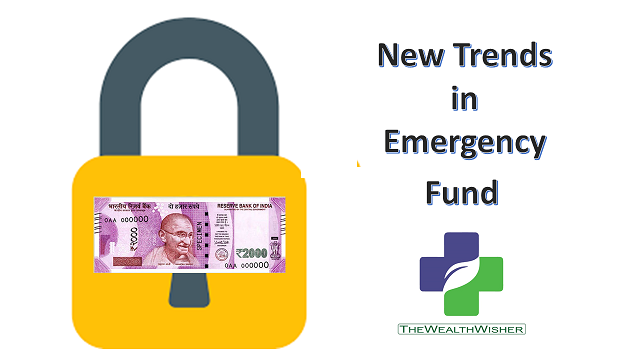Everyone coming on business channels or newspapers is calling the current times as Unprecedented, Black Swan & Recessionary. True the year 2020 is a time which will be remembered for long. The year is the best example of why we should not take things how they are – we should be ready & we should adapt to new. When it comes to personal finance, the learnings are immense – Let’s start today with Contingency Funds or Emergency Fund in India & New Trends.
Emergency Funds in India – This year:
- Our equity market corrected.
- Major markets including US equity market corrected.
- Debt took a U-turn and even some Liquid Funds corrected.
- Banks reached on the verge of failure.
- 3 months plus locked down ensured limited banking hours & empty ATMs.
- One of the MFs closed down 6 schemes restricting withdrawal in short term funds.
- Many Equity brokers & MF advisors who were not using technology, closed shops citing “Office Closed due to Pandemic” as a reason.
These reasons have made us uneasy because we know the circulation of money is stalled. You don’t know where to keep the money for contingency.
Of course it needs to be invested as keeping cash is not an option. This will be a security hazard otherwise.
Previously here is how Emergency Funds in India or Contingency fund was kept or invested.
The Traditional Way-
Financial Planners used to suggest a mix of FDs, Liquid & Short Term Funds & Savings Bank, Flexi FDs & Cash. The amount use to vary as per job security & monthly expenses.
The New Way –
We need to now include 3 more risks that have recently surfaced. One is the restriction of bank withdrawals due to regulator imposed restrictions, in case the bank fails or is on the brink of failure. The second risk is the loss of income (temporary or permanently) due to pandemic. The third is the liquidity crisis faced by mutual fund companies, where they restrict withdrawals.
Cash has become a savior.
This does not mean that one should start hoarding cash at home. Ten days to one month expenses cash is adequate. The rest should be invested in the avenues mentioned above.
He / She needs to:
- If you are investing without an emergency fund in India, you are not in the correct direction. It is high chances you will have to sell long term assets to meet short term requirements.
- In financial planning – First comes Insurance, Second is Contingency Fund & Third other investments as per goals. You should not alter this sequence and adequacy.
- Reassess the requirement once again. Maybe it’s time to increase the contingency fund amount in the future. With issues like a pandemic, one is not certain how long it will go & then recovery will also take time. If there is sole earning member one can take it to 12 months of expenses & 6-8 months if the spouse is also contributing. With your financial planner, a candid discussion is due.
- If your income is from rent or interest from deposits, you will likely face a tough time collecting it. Also, delays will happen. You need to take care of these situations while reassessing the contingency or emergency fund in India.
-
One should de-risk by spreading investments with more than one bank or mutual fund. Please understand that avenues from banks (Savings Account & Fixed Deposits) & MFs (Liquid funds, Short Term funds) will remain the same. But one can simply diversify it within the industry.
- It is also time that we do not “invest & forget”. We must be aware of the financial health of the institutions where we invest. It does not mean to have a “hawk eye”. But yes general awareness is mandatory. The moment you find red flags, review & take action.
- In terms of MF investments, one must not take aggressive calls with Contingency Funds. We recommend moving/investing in Liquid & Overnight Funds. Three years plus money can be invested in Corporate Bond Funds where majority portfolios are invested AAA-rated securities.
- If you have a planner, advisor or portfolio manager, ask him how he is going to take care of withdrawals if there is a lockdown situation. Can he manage transactions online? Has he invested in infrastructure to ensure liquidity for his clients?
- The priority of contingency funds securities should be – Liquidity first. Then followed by capital protection, returns & tax benefit.
- It is OK to dip into the emergency fund provided the reason is justified. You should have a clear plan on how to bring it back to the original level.
I hope you have points to make the necessary modifications to your contingency fund. It is better to run with the trend instead of finding yourself lazy in future.
Do ask me your queries on Emergency Fund in India using the comments section below.










